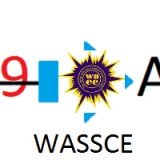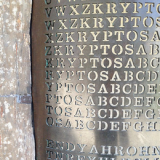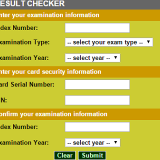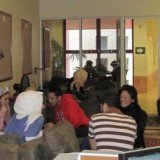Are you preparing for the West African Senior Secondary Certificate Examination? If yes, then you’re in the right place and should consider bookmarking this page. This page contains essential information about the WAEC exam and links to our WASSCE prep resources that help you to prepare for the WASSCE efficiently.
Our vision at LarnEdu is to support students in their quest for self-actualisation through education and we are doing so by providing them with all the resources they need to ace the required exams that will take them to the next level of education.
We’re not perfect but have always been working to improve everyday.
Have questions or suggestions? Use the comment section below or send us a message.
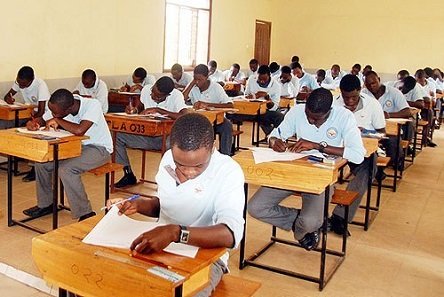
Resource List
Below are quick links to our essential and popular resources on the WASSCE.
| Title/Link | Information |
| Essential Information About the WASSCE | This is a link to the section on this page that covers all the essential information you need to know about the WASSCE including the test dates and more. |
| WAEC Syllabus | According to research, students who use the WAEC Syllabus to prepare for their exams perform better than those who do not.With our uploaded syllabus, you can have access to the WAEC syllabus wherever you are as long as you are with your mobile phone or personal computer. |
| WASSCE Past Questions | Past questions are valuable for preparing for external exams like WASSCE. They act like a compass, directing you to where questions will come from during the examination. We have past questions for many subjects offered in the WASSCE to help you prepare for the examination. You can have access to the past questions any time by downloading on your personal computer or mobile device. You can also view them from your browser. |
| How to Pass the WASSCE | Have you registered for your WASSCE exams but don’t know the next step to take? Read this definitive guide to get information on everything you need to know that will help you pass your exams with flying colours and probably get you a scholarship. |
| What to do if you Achieve a Poor WASSCE Result | Have you checked your WASSCE results and discovered it was poor? We have an outline of things you can do if you achieved a poor result including how you can fix it and alternatives to consider. |
| Common Reasons Students Fail the WASSCE | Here we have listed the main reasons students get poor results and how you can prevent it from ever happening to you or recurring if it has already happened. |
| Latest WASSCE Blog Posts | We regularly publish updates on the WASSCE and the latest prep tips for the exam. |
| How To Check Your WASSCE Result Online | A simple guide to take you through the steps on how to check your WASSCE result online. |
About The WASSCE
The WASSCE is a standardised test administered by the West African Examinations Council (WAEC).
The West African Senior School Certificate Examination (WASSCE) is a higher institution entry examination written by students in Anglophone West African Countries.
These countries are Ghana, Nigeria, Sierra Leone, Liberia, and the Gambia.
The West African Examinations Council (WAEC) also helps other examination bodies in coordinating examinations.
WASSCE / WAEC Exam Dates
The WASSCE / WAEC exam is written 2 times a year. These are:
January/February(Jan/Feb)
This was introduced in 2018 and is for private candidates.
May / June
This was formally known as the Senior School Certificate Examinations (SSCE). Only students from private and public schools are allowed to take this examination.
Candidates must wear their school uniforms during the examination day.
Results are usually out by August.
November / December (Nov/Dec)
This was formally known as the General Certificate Examinations (GCE).
Students from private and public schools are allowed to take this examination.
School uniforms are not compulsory since high school levers, graduates or dropouts are allowed to write this.
Examination results are usually available by December.
History
The West African Senior School Certificate Examination (WASSCE) was established because of the meeting by the University of Cambridge Local Examinations Syndicate, University of London School Examinations Matriculation Council and West African Departments of Education.
The meeting was meant to discuss the future policy of education in West Africa. At the meeting, the director of the University Of London Institute Of Education, Dr George Barker Jeffery was selected to visit some West African countries to see the general education level and requirements in these countries.
The countries Dr George Barker Jeffery was instructed to visit were Ghana, the Gambia, Sierra Leone, and Nigeria.
After his visit, he wrote a report currently known as the Jeffery Report.
In his report, he emphatically stated the need for a West African Examination Council. His report also contained detailed recommendations on the composition and duties of the Council.
In regards to Dr George Barker Jeffery’s report, the groups met with the governments of these countries, and an agreement was met.
The governments agreed to the establishment of the West African Examination council that would adopt Jeffery’s recommendations.
The legislative assemblies of Ghana, Sierra Leone, the Gambia and Nigeria passed an ordinance (West African Examinations Council Ordinance NO. 40) approving the West African Examination Council in Dec 1951.
The ordinance agreed to the coordination of exams and issuing of certificates to students who write the West African Senior Certificate Examination.
Liberia later issued their ordinance in 1974, at the annual meeting held in Lagos, Nigeria.
Acceptance and Guidelines for Admission
Most Universities in the US, Canada, UK, Estonia, Finland, Turkey, Cyprus, Russia, and more recognise the WASSCE.
However, some Universities / Colleges may require students with WASSCE / WAEC certificates/results to do a foundation year before they proceed to year one.
In Nigeria, students are still required to write the JAMB or Post UTME before they proceed to the university.
WASSCE Grading
According to a reliable source, grading for a particular subject on the WASSCE varies from region to region.
Take the following statistics for example:
Supposed WAEC grading for Elective / Further Mathematics in Nigeria for 2011:
| Grades | Definition | Interpretation | Equivalent |
| A1 | Excellent | 75%- 100% | 1 |
| B2 | Very Good | 74% -70% | 2 |
| B3 | Good | 65% – 69% | 3 |
| C4 | Credit | 60%- 64% | 4 |
| C5 | Credit | 55% – 59% | 5 |
| C6 | Credit | 50% – 55% | 6 |
| D7 | Pass | 45% – 49% | 7 |
| E8 | Pass | 40% – 44% | 8 |
| F9 | Fail | 0%-39% | 9 |
Supposed WASSCE grading for Elective / Further Mathematics in Ghana for 2011:
| Grades | Definition | Interpretation | Equivalent |
| A1 | Excellent | 80%- 100% | 1 |
| B2 | Very Good | 75% -79% | 2 |
| B3 | Good | 74% – 70% | 3 |
| C4 | Credit | 65%- 69% | 4 |
| C5 | Credit | 60% – 64% | 5 |
| C6 | Credit | 55% – 59% | 6 |
| D7 | Pass | 50% – 55% | 7 |
| E8 | Pass | 45% – 49% | 8 |
| F9 | Fail | 0%-44% | 9 |
WASSCE/WAEC Exam Subjects
- Further Mathematics
- Biology
- Chemistry
- Physics
- Geography
- Technical Drawing
- English Language
- English Literature
- Fine Art
- Music
- French
- Commerce
- Data processing
- Economics
- French
- Government
- Auto Mechanics
- Book keeping
To view more subjects written on the WASSCE, visit our WAEC Syllabus page.
Local Languages in Ghana:
- Dagaare
- Dagbani
- Dangme
- Ewe
- Ga
WASSCE and Other International Exams
The WASSCE / WAEC syllabus for some subjects is almost similar to that of some international exams. For example, the WASSCE syllabus for Chemistry is similar to the SAT syllabus for Chemistry.
This is why good students from schools that are WASSCE-oriented end up achieving good scores on the WASSCE.
Have suggestions or questions? Message us or use the comment section below.


